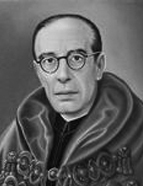

Paulo Merêa refuted Herculano's theses, as he also did in the case of D. Teresa's dowry and arras. On this topic, the historian presented evidence previously overlooked by Herculano, enabling him to refute Herculano's conclusions (Soares, T. S., “Prof. Doutor Manuel Paulo Merêa…”, 1969, pp. 14-15). Once again, Merêa conducted an in-depth analysis of the sources to validate his conclusions and challenge earlier historiographical theories.
This explains Merêa's numerous articles dedicated to clarifying the meaning of certain terms: “Sobre a palavra «atondo» (contribuição para a história das instituições feudais na Espanha” [On the word "atondo" (contribution to the history of feudal institutions in Spain)] (1924), “Reflexões sobre a origem da «jugada»” [Reflections on the origin of the term "jugada"] (1932), “Sobre a palavra «caritel»” [On the word "caritel"] (1933), “Sobre a palavra «manda»” [On the word "manda"] (1936) or even “Um problema filológico-jurídico: a palavra «arras»” [A philological and legal problem: the word "arras"] (1937). These articles were collected in 1937, in Novos Estudos da História do Direito [New Studies on the History of Law]. Merêa continued his philological studies, publishing in 1940 “Nótulas Filológicas” [Philological notes], “Sobre a palavra «angueira»” [On the word "angueira"] and "Para um glossário do nosso latim medieval" [Towards a glossary of our medieval Latin], in the following years, he continued to address philological and legal matters, as he referred to them in a 1945 article (“Dois problemas filológico-jurídicos” [Two philological and legal issues]), texts collected in Estudos de História do Direito I. Direito português. The author himself confessed that this was his violon d’Ingres , his favourite occupation (preface of Estudos de Direito Hispânico Medieval, t. 1, p. xix). Paulo Merêa's careful study of the sources of law has enabled him to support his innovative positions in the field of the history of law and institutions. These positions did not go unnoticed by the historiographical community of his time. In Portugal, Torquato de Sousa Soares criticised the historian's position as early as 1937, only to be later won over by his arguments (Soares, T. S., “Prof. Doutor Manuel Paulo Merêa…”, 1969, p. 15). In Spain, Valdeavellano and Sánchez-Albornoz opposed Merêa's theses on the ownership of the Portucalense lands (Valdeavellano, História de España, vol. I, 1952, p. 850; Sánchez-Albornoz, C., España… , t. 2, 1956, p. 426). To his critics, Merêa always gave answers based on reading and analysing documentary sources, mostly from private law (Soares, T. S., “Prof. Doutor Manuel Paulo Merêa…”, 1969, pp. 15-18).
This work is financed by national funds through FCT - Foundation for Science and Technology, I.P, in the scope of the projects UIDB/04311/2020 and UIDP/04311/2020.
